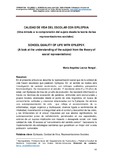| dc.rights.license | http://creativecommons.org/licenses/by-nc-sa/3.0/ve/ | es_VE |
| dc.contributor.author | Lacruz Rengel, María | |
| dc.date.accessioned | 2021-04-01T03:36:09Z | |
| dc.date.available | 2021-04-01T03:36:09Z | |
| dc.date.issued | 2021-03-31 | |
| dc.identifier.issn | ISSN 07983069 | es |
| dc.identifier.uri | http://www.saber.ula.ve/handle/123456789/47362 | |
| dc.description.abstract | En el presente artículo se describe la representación social que de la calidad de vida hacen escolares que padecen Epilepsia. En tal sentido se realiza esta investigación de carácter exploratorio, con enfoque cualitativo, perspectiva fenomenológica. Se incorporaron al estudio 12 escolares entre 8 y 15 años de edad, con Epilepsia de mas de un año de evolución. Se recolectó información a través de técnicas de evocación de palabras, entrevista semi-estructurada y grupos focales, analizadas desde el punto de vista lingüístico, en busca de conocimiento, actitudes y creencias relacionadas con la Epilepsia. Se obtiene una autorepresentación de vida que refleja el reconocimiento de su enfermedad, origen orgánico y multicausal, vivencia ligada a sentimientos de infelicidad, insatisfacción e inseguridad ante el control y descontrol de las crisis, y las limitaciones en el actuar impuestas por sus adultos significativos. Se autorepresentan presa de señalamiento, penalizados en sus capacidades, actores de un suceso implicante con impacto y desagrado social, con mala calidad de vida. El acceso al "conocimiento del sentido común" favorecería la implementación de estrategias sanitarias que garanticen un mejor vivir a esta población vulnerable. | es_VE |
| dc.language | Spanish | es |
| dc.language.iso | es | es_VE |
| dc.rights | info:eu-repo/semantics/openAccess | es_VE |
| dc.subject | Epilepsia | es_VE |
| dc.subject | Calidad de Vida | es_VE |
| dc.subject | Representaciones Sociales | es_VE |
| dc.title | Calidad de vida del escolar con epilepsia. (Una mirada a la comprensión del sujeto desde la teoría de las representaciones sociales) | es_VE |
| dc.title.alternative | School quality of life with epilepsy. (A look at the understanding of the subject from the theory of social representations) | es_VE |
| dc.type | info:eu-repo/semantics/article | es_VE |
| dc.description.abstract1 | This article describes the social representation of the quality of life made by schoolchildren suffering from Epilepsy. In this sense, this exploratory research is carried out, with a qualitative approach, phenomenological perspective. Twelve schoolchildren between 8 and 15 years old, with epilepsy of more than one year of evolution, were incorporated into the study. Information was collected through word evocation techniques, semi-structured interview and focus groups, analyzed from a linguistic point of view, in search of knowledge, attitudes and beliefs related to Epilepsy. A self-representation of life is obtained that reflects the recognition of their illness, organic and multi-causal origin, experience linked to feelings of unhappiness, dissatisfaction and insecurity in the face of the control and lack of control of the crises, and the limitations in acting imposed by their significant adults. They represent themselves prey of pointing out, penalized in their capacities, actors of an implicating event with impact and social displeasure, with poor quality of life. Access to "common sense knowledge" would favor the implementation of health strategies that guarantee a better life for this vulnerable population. | es_VE |
| dc.description.colacion | 68-88 | es_VE |
| dc.description.email | fermenta@ula.ve / humanic@ula.ve | es_VE |
| dc.description.email | lacruz_rengel@hotmail.com | es_VE |
| dc.description.paginaweb | www.saber.ula.ve/fermentum | es |
| dc.identifier.depositolegal | pp1991102ME302 | es |
| dc.publisher.pais | Venezuela | es_VE |
| dc.subject.centroinvestigacion | Centro de Investigaciones HUMANIC | es |
| dc.subject.institucion | Universidad de Los Andes | es_VE |
| dc.subject.keywords | Epilepsy | es_VE |
| dc.subject.keywords | Quality of Life | es_VE |
| dc.subject.keywords | Social Representations | es_VE |
| dc.subject.seccion | Fermentum: Artículos | es_VE |
| dc.subject.tipo | Revistas | es_VE |
| dc.type.media | Texto | es_VE |


